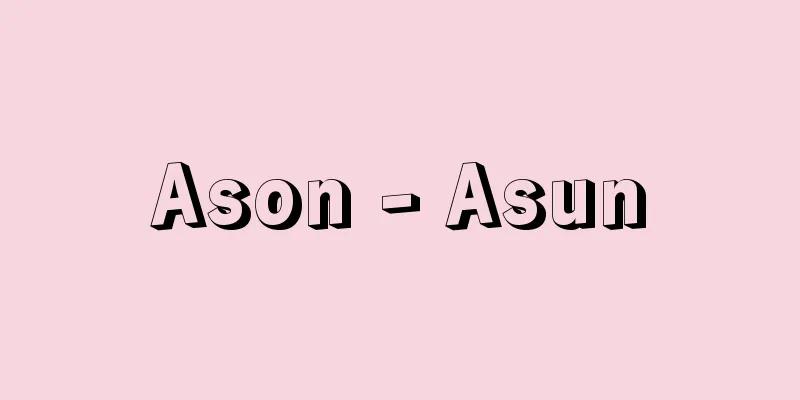Ason - Asun

|
{A phonetic change of "asomi." In the Middle Ages and early modern times, it was also called "ason."} 1 Same as “Asomi (Ason).” 2. Since the Heian period, it has been used as a title of respect for people of fifth rank or higher. 3. (Used as a pronoun) A term used for boys among court aristocrats during the Heian period. "---, please find a place to rest." (Genji, Fujiuraha) Asomi [ ▽ Asa ▽ Master]Cho-shin [Teu-] [Ason]Ahson [ ▽ Asa ▽ Master]Source: About Shogakukan Digital Daijisen Information | Legend |
|
《「あそみ」の音変化。中・近世は「あっそん」とも》 1 「あそみ(朝臣)」に同じ。 2 平安時代以降、五位以上の人につけた敬称としての 3 (代名詞的に用いて)平安時代、宮廷貴族間で使われた、男子に対する呼び方。 「―や、御休み所もとめよ」〈源・藤裏葉〉 あそみ【▽朝▽臣】ちょう‐しん〔テウ‐〕【朝臣】あっそん【▽朝▽臣】出典 小学館デジタル大辞泉について 情報 | 凡例 |
<<: Atā (English spelling) 'aṭā'
>>: Azores high pressure - Azores high pressure
Recommend
Gude, H.
...National romanticism fostered outstanding arti...
Hot weather concreting
…It is best to use moderate-heat Portland cement ...
Wei Heng - Eiko
… [Mikuni to Nanbokucho period] From the Three Ki...
Blue stone
〘Noun〙① A general term for blue or green rocks. Cr...
Ishizuchi Prefecture
…After the Meiji Restoration and the return of th...
uli'uli (English spelling) uliuli
...The basic instruments that accompany the hula ...
Imperial system - Imperial system (English spelling) foot-pound-second system
The measurement system of English-speaking countri...
Tarantismo
...These strange dancing diseases are also called...
Living material concept - Seigukannen
A translation of the Latin phrase idea innata. Ide...
dumki
...It refers to folk songs or instrumental music ...
Aviation accident - koukujiko
This refers to damage to persons or property caus...
Kashikodokoro - Kashikodokoro
It is also read as "Kensho." It is the ...
Antaboos - Antaboos
...However, outpatient treatment will not be succ...
ATOM CORPORATION
Official company name: "Atom Co., Ltd." ...
Onnep - Onnep
...In Japan, it lives on the coasts of the cold z...

![Kubokawa [town] - Kubokawa](/upload/images/67cb6b606b829.webp)







